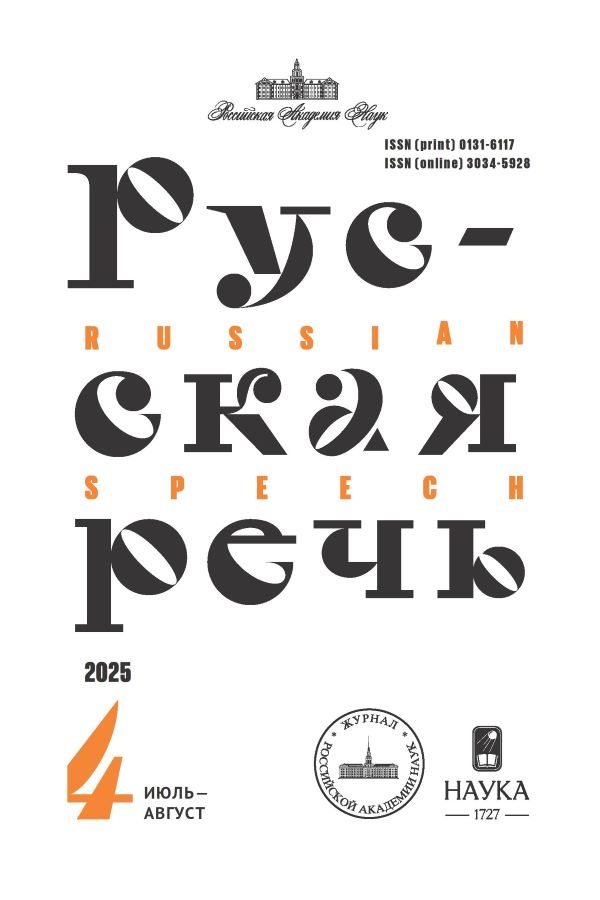Ideologeme Pochva (‘Soil’) and Its Origin (On the Material of Ivan S. Aksakov’s Journalism)
- Authors: Sekiro O.O.1
-
Affiliations:
- Institute for Linguistic Studies of the Russian Academy of Sciences
- Issue: No 4 (2025)
- Pages: 100-114
- Section: The Language of Fiction
- URL: https://consilium.orscience.ru/0131-6117/article/view/689163
- DOI: https://doi.org/10.31857/S0131611725040087
- ID: 689163
Abstract
Current article considers specific features of author’s comprehension of the ideologeme pochva (‘soil’) in Ivan S. Aksakov’s journalism. Journalistic texts constituted the majority in the Russian standard language of the 19th century; ideologemes’ semantics was determined with author’s point of view in texts of that type. Thus, in case of words’ history in 19th century consideration the analysis of works belonged to different social-political direction is required. One is the main direction of the 19th-century public discussion was Slavophilism. Slavophiles’ works have not been researched thoroughly by linguists. The research is held on the material of Ivan S. Aksakov’s journalistic texts, because this author has designed a particular social-political conception on the base of senior slavophiles’ theoretical views as a part of the public discussion’s context. The analysis of the ideologeme’s pochva usage in Aksakov’s texts shows the meaning ‘the deepest point, the consistent development is based on’. The contextual environment of the word we consider includes vocabulary the political metaphor «ground-soil» is represented with. It actualizes religious and social-political components of meaning simultaneously, and elements of the direct meaning. The semantic specific of the word pochva in Ivan S. Aksakov’s journalism has been caused by influence of the word Boden and contextual semantic interaction of words. Words’ organization in contexts is influenced by slavophiles’ perception of the German philosophy tradition. In this way the research can complement the word’s pochva semantic history in 19th century brought forward by Viktor V. Vinogradov, and denote the word’s terrain influence’s lack in it.
Full Text
About the authors
Olga O. Sekiro
Institute for Linguistic Studies of the Russian Academy of Sciences
Author for correspondence.
Email: olgasekiro@yandex.ru
Russian Federation, St. Petersburg
References
- Avanesov R. I. (ed.). Slovar’ drevnerusskogo yazyka (XI–XIV vv.) [Dictionary of the Old Russian language (11–14th centuries)]. In 12 vols. Vol. 3. Moscow, Russkii Yazyk Publ., 1990. 512 p.
- Barkhudarov S. G. (ed.). Slovar’ drevnerusskogo yazyka XI–XVII vv. [Dictionary of the Old Russian language of the 11–17th centuries]. In 30 vols. Vol. 5. Moscow, Nauka Publ., 1978. 393 p.
- Barsht K. A. [Concept pochva (‘soil’) in works of senior Slavophiles and F. M. Dostoevsky]. Vestnik SPbGU. Jazyk i literatura, 2022, vol. 19, no. 1, pp. 4–28. (In Russ.)
- Bel’chikov Ju. A. Russkii literaturnyi jazyk vo vtoroi polovine XIX veka [The Russian standard language in the 2nd half of 19th century]. Moscow, Vysshaya Shkola Publ., 1974. 192 p.
- Berdyaev N. A. Russkaya ideya [The Russian concept]. St. Petersburg, Azbuka-Klassika Publ., 2008. 318 p.
- Budilov V. M. [Savigny and the Russian national law knowledge development in the 1st half of 19th century]. Pravovedenie, 2014, no. 3, pp. 156–187. (In Russ.)
- Chudinov A. P. Politicheskaya lingvistika [Political linguistics]. Moscow, Flinta; Nauka Publ., 2007. 254 p.
- Cimbaev N. I. Slavyanofil’stvo: Iz istorii russkoi obshhestvenno-politicheskoi mysli [Slavophilism: from the history of the Russian social-political thoughts]. Moscow, Moscow State University Publ., 1986. 273 p.
- Evgen’eva A. P. (ed.). Slovar’ russkogo yazyka [Dictionary of the Russian language]. In 4 vols. Vol. 3. Moscow, Russkii Yazyk; Polygraph Resources Publ., 1999. 752 p.
- Karaulov Yu. N. (ch. ed.). Slovar’ yazyka Dostoevskogo. Idioglossarii. N–Po [Dostoevsky’s Dictionary of Language. The Idioglossary. N–Po]. Moscow, Azbukovnik Publ., 2017. 856 p.
- Kolesov V. V. [Historical purposes of word’s polysemy and linguistic ways of its elimination]. Russkoe semanticheskoe slovoobrazovanie [Russian semantic word formation]. Izhevsk, Izhevsk State University Publ., 1984, pp. 18–28. (In Russ.)
- Kozlovskaya N. V. [The Russian religious-philosophical text: new genres and new terms]. Vestnik Cherepovec. gos. un-ta, 2015, no. 5, pp. 88–92. (In Russ.)
- Kupina N. A. [Living ideological processes and culture of speech issues]. Jazyk. Sistema. Lichnost’ [Language. System. Person]. Ekaterinburg, Ural State University Publ., 2005, pp. 90–104. (In Russ.)
- Makovskii M. M. Ehtimologicheskii slovar’ sovremennogo nemetskogo yazyka: Slovo v zerkale chelovecheskoi kul’tury [Etymological dictionary of modern German: A Word in the mirror of human culture]. Moscow, Azbukovnik Publ., 2004. 632 p.
- Pfeiffer W. Etymologisches Wörterbuch des Deutschen [Etymological Dictionary of German]. Available at: https://www.dwds.de/wb/etymwb/bodenständig (accessed 5.10.2024).
- Radbil’ T. B. Mifologiya jazyka Andreya Platonova [Andrew Platonov’s language mythology]. Moscow, Nizhniy Novgorod, Nizhny Novgorod State University Publ., 1998. 116 p.
- Sorokin Yu. S. Razvitie slovarnogo sostava russkogo literaturnogo jazyka. 30–90 gody XIX veka [The Russian language vocabulary development in 30–90s of 19th century]. Moscow, Leningrad, Nauka Publ., 1965. 565 p.
- Teslya A. A. Poslednii iz “otcov”: Biografiya I. S. Aksakova [The last of “fathers”: Ivan S. Aksakov’s biography]. Moscow, Vladimir Dal’ Publ., 2015. 799 p.
- Timofeev K. A., Medelets N. M. (eds.). Slovar’ sovremennogo russkogo literaturnogo yazyka [Dictionary of modern Russian literary language]. In 17 vols. Vol. 5. Moscow, Leningrad, Publishing House of the USSR Academy of Sciences, 1960. 1774 p.
- Valickii A. V krugu konservativnoi utopii. Struktura i metamorfozy russkogo slavjanofil’stva [In the circle of conservative utopia. Structure and metamorphoses of the Russian Slavophilism]. Transl. by K. Dushenko. Moscow, Novoe Literaturnoe Obozrenie Publ., 2019. 704 p.
- Vinogradov V. V. Ocherki po istorii russkogo literaturnogo jazyka XVII–XIX vv. [Essays on history of the Russian standard language of 17–19th centuries]. Moscow, Vysshaya Shkola Publ., 1982. 528 p.
- Vinogradov V. V. [Soil]. Vinogradov V. V. Istorija slov [History of words]. Moscow; IRL RAS Publ., 1999. 1138 p.
- Zaharov V. N. [“Pochvennichestvo” in the Russian literature: metaphor as ideologeme]. Problemy istoricheskoi pojetiki [Problems of historical poetics]. Petrozavodsk, Petrozavodsk State University Publ., 2012, pp. 14–24. (In Russ.)










